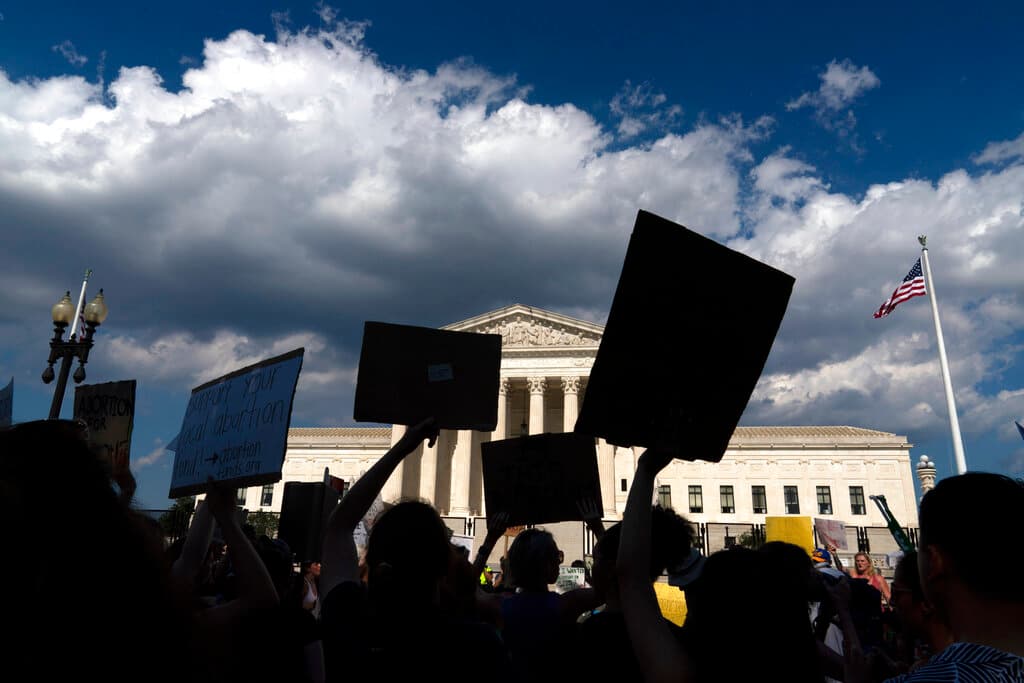Unlikely Alliance Blooming Between Religious Rights, Abortion Rights Movements
Jewish leaders are crusading against abortion bans, arguing that they constitute governmental encroachment on an inherently religious choice.

Religious worship and abortion advocacy do not typically go hand in hand, yet in the wake of the Supreme Court’s reversal of Roe v. Wade some Jewish leaders are launching a crusade against abortion bans in the name of religious liberty.
Rabbi Barry Silver of Congregation L’Dor Va-Dor in Palm Beach County is suing Florida over its new law banning abortions after 15 weeks, except when the mother’s life is in danger. He contends that the law, which took effect July 1, infringes upon religious liberty and privacy rights protected in the Florida constitution.
“When children are born outside of marriage, against the will of the mother, this harms the sanctity of the Jewish home and family, and does incalculable harm to Jewish women,” the complaint states.
“Preventing families from enjoying the freedom to determine the number of children that they can raise responsibly, also does great harm to our society and shows a disregard for the sanctity of life, which is among the highest ideals of the Jewish people.”
Rabbi Silver’s campaign to secure abortion access, described on his website as the Helping Emancipate Abortion Rights Today initiative, is gaining traction, with Unitarian and Buddhist ministers filing similar lawsuits in Florida court this week. An attorney who has argued five times before the Supreme Court, David Ferleger, will represent each complainant.
Rabbi Silver views anti-abortion legislation as a collapse of the separation of church and state enshrined in the First Amendment. He argues that abortion is an inherently religious choice, protected by Jewish legal codes, which prioritize the rights of the mother over those of the fetus.
“The Torah solidly comes down in saying that human life begins at birth,” Rabbi Silver told the Sun. “There’s never been a case in all of Jewish history or all of Jewish jurisprudence where a woman was punished for having an abortion.”
The mother “can’t be a martyr” for a fetus that threatens her own life, called a Rodef in traditional Jewish law, Rabbi Silver said. “If the fetus is causing any problems for the mother — physical, psychological — up until the time of birth, she’s not only entitled, she’s required to have an abortion to protect her.”
Other rabbis, however, interpret the Torah’s definition of threats to maternal health more narrowly. Sacred Jewish texts do not support unfettered access to abortion, the managing director of a group that advocates for traditional Jewish ideas, the Coalition for Jewish Values, argued. According to this view, Rabbi Yaakov Menken said, laws banning abortion except to save the life of the mother align with Jewish principles.
Rabbi Menken sees Rabbi Silver’s campaign as an exploitation of religion to achieve progressive political goals. “You can’t claim the First Amendment supports your ability to do whatever it is you wish to do,” Rabbi Menken said.
Many Jewish organizations regard limitations on abortion access as diametrically opposed to religious worship. The American Jewish Committee, the Anti-Defamation League, Hillel International, the Women’s Rabbinic Network, and the National Council of Jewish Women, among others, condemned the Nine’s decision to return the issue of abortion to the states.
In exposing both Jewish women and any rabbis who counsel them on terminating their pregnancy to risk of legal punishment, stringent abortion bans are “making the practice of Judaism a crime,” Rabbi Silver said: “They would require a woman against her will to bear the job of a rapist or to bear a child that’s doomed to die. That goes against Judaism.”
Legal issues may arise in states where abortion laws affirm the beliefs of their fundamentalist Christian population — who generally view conception, not birth, as the beginning of life — but deny those of their Jewish minorities that favor abortion rights.
“Will the court be able to abide” by a religious perspective that sees the right to abortion as essential, “or will they say, no, we only meant it for Christians, we didn’t mean it for Jews?” the chairman emeritus of Jewish studies at the Graduate Center of the City University of New York, Samuel Heilman, asked. “The inconsistency in this case would force them to choose between one religion and another.”
The lawsuits filed by Rabbi Silver and other religious leaders might serve as a template for challenges to abortion bans across the nation.“The First Amendment is the most important amendment in the Constitution,” Rabbi Silver said. “All of our other liberties are dependent upon it.”

